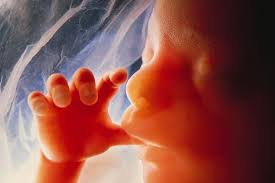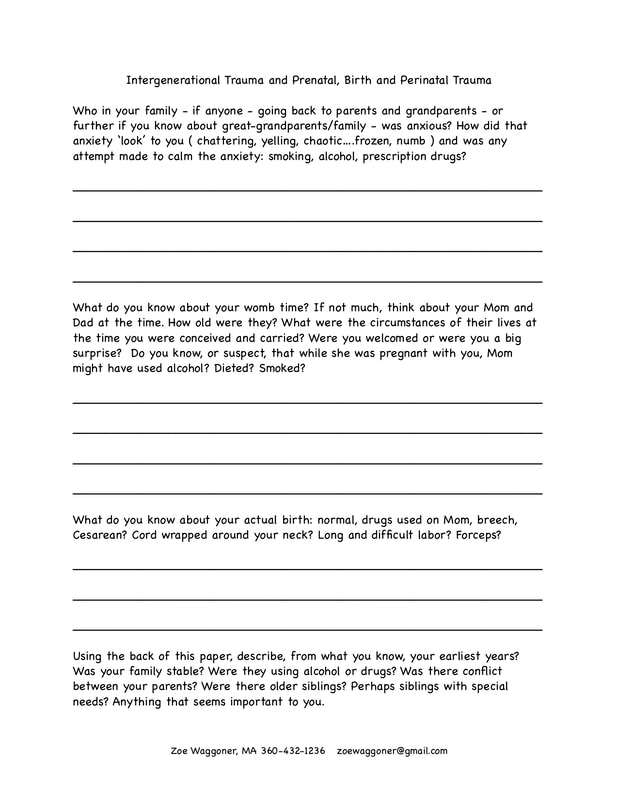|
I have an Anxiety Support Group beginning January 17th, 2019! You can read more at the page: www.zoewaggoner.com/anxiety-support-group.html In preparation for that group I thought it might be interesting to share with you, dear reader, some of the work and the paperwork I share with the group before we begin, and weekly thereafter. Before the participants ever arrive I send out a questionnaire and an article. The first is questions about Intergenerational Trauma and any pre-birth-or-perinatal trauma you might know about or just suspect. This is information for you to share our first night if you choose. I want people to understand that at least 75% of the time people in the group, or clients, can point to parents or grandparents who also were anxious or depressed. They might not have said they were, but when the person looked back at their behavior and general attitude, they realized the issues did not start with them! Second I send out an article I like called "Emotional Trauma in the Womb" by Samuel Lopez De Victoria, Ph.D. Believe it or not, this is actually an area that has been overlooked for years in the medical community. With the advent of Birth Psychology and studies including pre-birth-perinatal trauma, more people are writing about it and treating/healing and resolving trauma before birth, during or after birth. Again, this is to share or not. People are often surprised when they begin to ponder life before life.  Emotional Trauma in the Womb , Samuel López De Victoria, Ph.D. This is an article I recently came across about womb trauma. I have changed some pieces to reflect more diverse situations and life styles. “The caller complained, “I’ve been sad all my life. I’ve been to many therapists and none have been able to help me get rid of my sadness. Do you think you can help me?” Since I have seen many similar cases like this before, I told the caller, “I have a good hunch on what is going on. Come on over and lets see if I can help.” After briefly treating the person, the sadness was gone and it has stayed that way ever since. I have treated hundreds of these situations where individuals have been able to experience release of seemingly hopeless issues. What has made the difference? There is a growing body of research showing that babies in the womb feel, taste, learn, and have some level of consciousness. One study had babies in the womb receiving “vibroacoustic stimulation” (Gonzalez-Gonzalez et al., 2006). That is a fancy way of saying sound waves were transmitted. For comparison purposes, there was also a control group that did not receive the treatment. After they were born, the babies who had received the stimulation were again given the same treatment. The result was that these babies recognized the signal and tended to calm down after receiving the signal. The researchers concluded that fetal life is able to learn and memorize with this capacity lasting into neonatal life (post-birth). In other research, Anthony DeCasper and William Fifer created a nipple that was connected to an audio device (Kolata, 1984). This nipple test was given to 10 newborn babies. If a child sucked in one way they would hear their mother’s voice. Sucking in a different pattern would cause the child to hear another woman’s voice. The researchers found that the babies sucked in a way to hear their mothers. The same experiment was done using the sound of the mother’s heart beat and that of a male voice. The result was that the babies sucked in such a way as to hear the mother’s heart beat more often than the male voice. DeCasper later did another test where he had sixteen pregnant women read a children’s book. They read the book out aloud twice a day for the last 6.5 weeks of their pregnancy. Once born, the babies were given the nipple test previously mentioned where they could listen either to their mother reading the original children’s book that was used or another book. The babies sucked to hear the original children’s book. What DeCasper concluded was that a prenatal auditory experience can influence auditory preferences after birth. An author and well known obstetrician, Christiane Northrup (2005) shares that if a pregnant mother is going through high levels of fear or anxiety she creates a “metabolic cascade.” Hormones known as cytokines are produced and the mother’s immune system is affected, including her child’s. Chronic anxiety in the mother can set the stage for a whole array of trauma based results such as prematurity, complications of birth, death, and miscarriage. The opposite is also true. When the mother is feeling healthy and happy, she produces oxytocin. This is often called the molecule of belonging. The presence of this component creates feelings of bonding and strengthens immunity in the baby. Neurotransmitters moving inside the mother’s body creates a chemical and physical imprint on the baby’s brain and body. The message imprinted is that there is safety and peace. The baby feels secure and taken care of. Can a baby learn while in the womb? The research seems to point in that direction. In terms of mental health, can this be a clue to psychological issues adults exhibit? In some cases, I think so. I feel this way, not because I have done peer-reviewed research on the matter, but because of the hundreds that I have treated for their fetal life traumas. They experienced significant or total reduction of their negative and dysfunctional issues. Many of these patients had previously exhibited spontaneous and abrupt feelings of anger, fear, sadness, loneliness, hyper-vigilance and even co-dependent enablement. The next time you experience one of these emotions and you cannot figure out where it came from perhaps it came before your physical birth. You may have had detached or scared parents. You could have had parents who did not want to get pregnant and felt resentment. Maybe your parents were depressed and lonely. Or the larger family was not happy, there were money issues, too many older children, lack of coping skills, alcohol or drugs. Lots of ‘possibles’. Hopefully, you had happy and content parents who nurtured you and enjoyed you.” References Gonzalez-Gonzalez, N. L., Suarez, M. N., Perez-Pinero, B., Armas, H., Domenech, E., & Bartha, J. L. (2006). Persistence of fetal memory into neonatal life. Acta Obstetricia et Gynecologica, 85, 1160-1164. doi: 10.1080/00016340600855854 Kolata, Gina (1984). Studying learning in the womb. Science, 225, 302-303. doi: 10.1126/science.6740312 Northrup, C. (2005). Mother-daughter wisdom. New York, NY: Bantam Books.
0 Comments
Leave a Reply. |
Zoe ~
I am a catalyst for others, helping people continue, over their entire life span - preconception, conception, in the womb and after - to grow, learn, heal so that each person can live their deepest longings. This is my passion and purpose. Adventurer, lover of beauty, seeking clarity, harmony & balance. Compassionate. Just. Fair. Grateful. Hugely grateful. ONE more time: HUGELY GRATEFUL. |




















